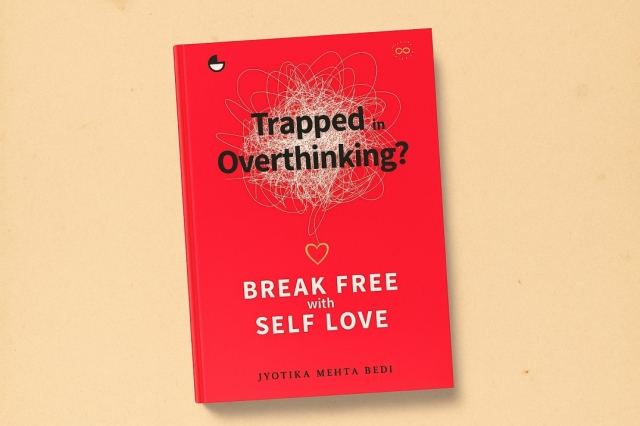Some books shout at you to change your life. Others gently sit beside you and ask how you are really doing. Trapped In Overthinking Break Free With Self Love by Jyotika Mehta Bedi is firmly in the second category.
It is not dramatic. It is not trying to reinvent the concept of personal growth. And that is exactly what makes it so comforting.
The entire reading experience felt less like flipping pages and more like pausing for small honest conversations with myself. I did not feel judged. I did not feel rushed. I felt understood.
Why I Picked This Up
I have always had a tendency to live in my head. Overthinking is not just a habit at this point. It is practically part of my personality. So when I saw the title, it felt like someone had just called me out in the kindest way possible.
What I hoped for was a book that would tell me how to stop spiraling. What I found was something deeper. A gentle but firm reminder that I deserve peace. Not just in theory. In practice. Every day.
Also Read: Design Your Thinking Book Review
What Makes It Different
There are plenty of books that touch on self love and healing. Most are filled with inspiring ideas but very few give you something real to hold on to.
Jyotika does not just give you inspiration. She gives you something to do with it.
From the very first chapter, it is clear that she is not writing from a pedestal. There is no preaching. Just a lot of reflection, real-life observations, and tools that make you go oh this is doable.
She talks about the real stuff. The self doubt. The guilt we carry. The mental noise that never stops. But more importantly, she talks about the things we can do about them. Slowly. Gently.
The language is so human. You don't need a background in psychology or a library of self help books to follow along. Everything is broken down in a way that feels approachable and personal.
A Walk Through the Chapters
The book flows naturally. It starts with exploring what self love actually means and why we often struggle to truly embrace it.
Then it gently moves into bigger areas like how we form beliefs about ourselves, how our childhood patterns show up in our adult lives, and how forgiveness plays a massive role in healing.
She touches on emotional boundaries with so much clarity. I honestly had a few aha moments reading those pages. Especially the idea that boundaries are not walls to keep people out but bridges that let the right kind of connection in.
The chapters also come with takeaway points and affirmations. I usually skip those in other books. But here, they felt like small check-ins. Little grounding moments before moving on.
Also read: Breaking The Bubble Book Review
Real World Application
One of the things I appreciated most is how much of this can be applied immediately.
There are short exercises that help you track your thoughts or challenge your inner critic. Not complex tasks. Just things that slowly build awareness and help you catch your mental habits before they pull you under again.
There was one journaling prompt about how you speak to yourself when no one is listening. That one hit me. I didn't even realize how harsh I had become with my inner dialogue until I saw it written in my own handwriting.
From that point on, the rest of the book felt even more personal. Like it had waited for me to open that door.
Not a Quick Fix
This book does not promise you that you will be a new person in ten days. It is not offering a complete transformation with a perfect routine and a checklist of things to tick off.
What it offers instead is presence. It invites you to look at yourself with softness and begin where you are.
That is why it works.
It meets you in your mess without asking you to clean it all up first.
Who Should Read This
If you are tired of being overwhelmed by your own thoughts
If you are constantly second guessing your choices
If you are great at giving love to others but not so great at keeping some for yourself
Then this book is for you.
It won't solve everything. But it will help you feel less alone in what you are going through. And sometimes that is the most important step.
I would especially recommend it to people who are new to the idea of self work and want something that feels supportive rather than clinical.
It is also a great companion for anyone going through a transition, whether that is emotional, professional, or relational. The kind of read that gives you room to breathe.
A Final Word
When I closed the last page, I didn't feel like I had finished a book. I felt like I had just stepped out of a quiet conversation where someone saw parts of me I usually keep hidden.
Trapped In Overthinking doesn't fix you. It doesn't ask you to become someone else.
It helps you come home to yourself.
And that might just be the most radical kind of self love there is.






